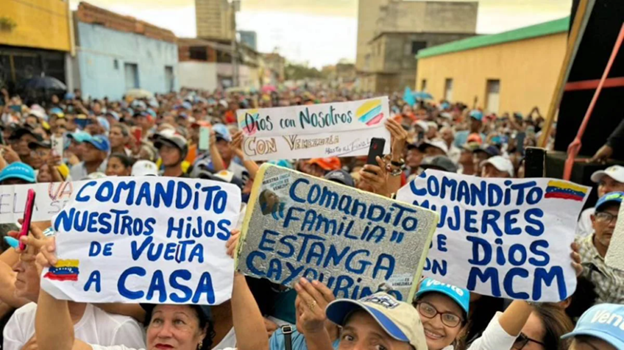
HAVANA TIMES – Venezuela stands at the threshold of a potential political shift, with a presidential election on Sunday, July 28th, determining the end or continuation beyond 2030 of the populist, left-wing, and increasingly authoritarian government that has ruled for a quarter of a century.
President Nicolas Maduro, 61, the heir of the late leader Hugo Chavez, who governed from 1999 to December 2012, seeks re-election for a third term (2025-2031). However, for the first time, the opposition shows a majority in the streets and in polls, favoring their candidate, Edmundo González, 74.
Of ten traditional polling firms, nine attribute a voting intention between 55% and 70% to Gonzalez, only one presents Maduro as the winner (with 52% versus 21% for his opponent), and the other eight candidates —all men— obtain negligible percentages.
“The biggest differences lie in the estimated turnout, but everything suggests it will be very high and reflect what the polls and mobilizations show,” political analyst Carmen Beatriz Fernandez told IPS.
In Maduro’s rallies, there is a greater display of resources, and he has combined promises for each region he visits if re-elected, with performances where he sings, dances, jogs, or drives a bus —his job over 30 years ago— to show he is fit.
Gonzalez, a retired diplomat with a calm demeanor, attended mass events organized by the popular opposition leader Maria Corina Machado, 56, his main supporter, who draws enthusiastic crowds in her tours and rallies.
Fernandez believes “it is like the awakening of a country that was half asleep and now shows that change is not only desirable but possible through voting, and with an opposition unity…”
Venezuela, with about 28 million inhabitants —7.7 million have emigrated, mostly in the last 10 years, according to United Nations figures— has an electoral roll of 21.3 million potential voters, but all analyses discount at least 4.5 million voters who cannot vote because they are abroad.

Crisis and Change
Beneath the mantle of numbers, the polls —prohibited by electoral legislation a week before the vote—have detected a strong desire for change after years of suffering from the prolonged social and economic crisis, of which migration has been the most visible expression, especially in neighboring countries.
In eight of the last ten years, the Gross Domestic Product (GDP) lost almost four-fifths, oil production fell to a quarter of what it was in 2013, the value of the currency was eroded, there was hyperinflation for four years (130,000% in 2018), public services collapsed, and salaries are the lowest in Latin America.
The country seems populated with stories like that of Nancy G., 50, a former cook in a restaurant with two adult children and a former government supporter, who migrated to Colombia with her husband and “since things did not go well, we returned and set up a small food stall” at an intersection in eastern Caracas.
But “we lost what we invested there, between people’s low income and cooking


